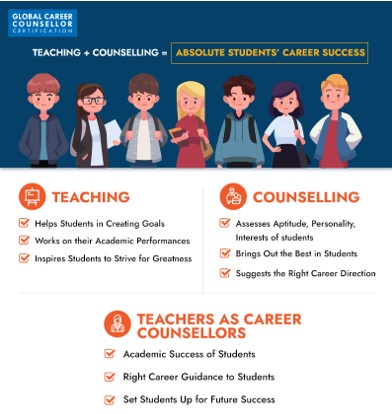5 Basic Differences Between Teaching And Counselling
3rd July 2023
Teaching and counseling are two distinct fields that involve interacting with individuals in different ways to support their growth and development. While they share certain similarities, such as the goal of facilitating learning and personal development, there are fundamental differences between teaching and counseling. Teaching primarily involves imparting knowledge and skills to students in an educational setting, whereas counseling focuses on addressing personal, emotional, and psychological issues to promote well-being and personal growth. Keep reading on to understand the basic differences between the two roles.
Basic Differences Between A Teacher And Counsellor You Should Know Now

Source: www.globalcareercounsellor.com
Take a look at how these professions differ significantly and call for different techniques and strategies.
1. Role Of A Teacher And Counsellor
Teachers play a role in instructing, guiding, and facilitating learning. They act as mentors, role models, and sources of knowledge and support for students. They are subject matter experts who possess specialized knowledge in their respective fields. They use their expertise to design curricula, plan lessons, and assess student performance. Additionally, the content of teaching is structured around academic subjects and curriculum requirements. They also focus on delivering specific content, often following a predetermined syllabus. Furthermore, teachers assess student learning through exams, quizzes, assignments, and projects. They use various methods to evaluate understanding and provide feedback on academic performance.
Counselors play a role in providing emotional support, empathy, and guidance. They act as facilitators, helping clients gain insight, develop coping strategies, and make positive changes. They are trained professionals with expertise in psychology, counseling techniques, and human behavior. They employ therapeutic approaches and interventions to help clients overcome challenges and achieve personal growth. Needless to mention, the content of counseling is individualized and tailored to the client's needs. The focus is on exploring personal experiences, emotions, and thoughts to promote self-understanding and problem-solving. They also assess clients' emotional well-being, mental health, and personal growth using standardized tests, interviews, and self-report measures. They evaluate progress and adjust interventions accordingly.
2. Main Purpose And Goal Of Teacher And Counsellor
The main purpose of teaching is to transfer knowledge, information, and skills to students. The goal is to facilitate learning, promote academic growth, and develop specific competencies. Teaching focuses on a broad range of academic subjects, covering various disciplines and knowledge areas. The emphasis is on providing a comprehensive education across multiple subjects.
The primary purpose of counseling is to provide emotional support, guidance, and assistance to individuals facing personal challenges. The goal is to improve mental health, promote self-awareness, and enhance overall well-being. Counseling addresses specific personal, emotional, and psychological issues, such as stress, anxiety, relationships, career choices, and self-esteem. It aims to resolve specific problems and promote personal growth.
3. Relationship With Clients
The teacher-student relationship is typically hierarchical, with the teacher taking on an authoritative role. The focus is on transmitting knowledge and maintaining discipline. Teaching is typically conducted within a structured timeframe, such as a school semester or academic year. Teachers follow a predefined schedule and cover specific topics within set time limits.
The counselor-client relationship is collaborative and non-hierarchical. The counselor provides a supportive and empathetic environment, fostering trust and encouraging self-exploration. Counseling sessions are more flexible and individualized. The duration and frequency of sessions depend on the client's needs and progress. Counseling can occur on a short-term or long-term basis.
Don’t Wait And Start Your Journey As A Counsellor Now
If you are an educator who is looking forward to becoming a skilled and trained counselor then upgrade your career with counseling courses for teachers. These courses will not only help you to understand the different perspectives demanded by both roles but also offer blended learning to understand your students better and offer correct guidance.
Find the right course for you and try out the course. Contact us at: +91-6292137532. You can also mail us at act@asiancollegeofteachers.com.
Written By : Sanjana